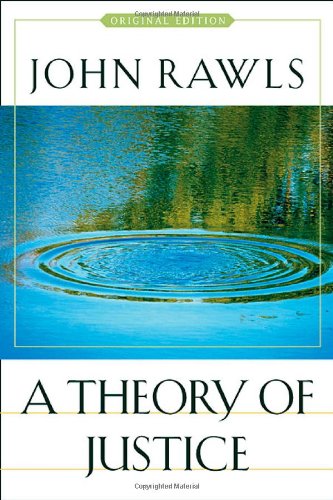A Theory of Justice 1st Edition by John Rawls ISBN 0674042603 9780674042605
$50.00 Original price was: $50.00.$35.00Current price is: $35.00.
A Theory of Justice 1st Edition by John Rawls – Ebook PDF Instant Download/Delivery: 0674042603, 9780674042605
Full download A Theory of Justice 1st Edition after payment
Product details:
ISBN 10: 0674042603
ISBN 13: 9780674042605
Author: John Rawls
A Theory of Justice 1st Edition: John Rawls aims to express an essential part of the common core of the democratic tradition—justice as fairness—and to provide an alternative to utilitarianism, which had dominated the Anglo-Saxon tradition of political thought since the nineteenth century. Rawls substitutes the ideal of the social contract as a more satisfactory account of the basic rights and liberties of citizens as free and equal persons. “Each person,” writes Rawls, “possesses an inviolability founded on justice that even the welfare of society as a whole cannot override.” Advancing the ideas of Rousseau, Kant, Emerson, and Lincoln, Rawls’s theory is as powerful today as it was when first published. Though the revised edition of A Theory of Justice, published in 1999, is the definitive statement of Rawls’s view, much of the extensive literature on his theory refers to the original. This first edition is available for scholars and serious students of Rawls’s work.
A Theory of Justice 1st Edition Table of contents:
Part One: Theory
-
Chapter I: Justice as Fairness
-
The Role of Justice
-
The Subject of Justice
-
The Main Idea of the Theory of Justice
-
The Original Position and Justification
-
Classical Utilitarianism
-
Some Related Contrasts
-
Intuitionism
-
The Priority Problem
-
Some Remarks about Moral Theory
-
-
Chapter II: The Principles of Justice
-
Institutions and Formal Justice
-
Two Principles of Justice
-
Interpretations of the Second Principle
-
Democratic Equality and the Difference Principle
-
Fair Equality of Opportunity and Pure Procedural Justice
-
Primary Social Goods as the Basis of Expectations
-
Relevant Social Positions
-
The Tendency to Equality
-
Principles for Individuals: The Principle of Fairness
-
Principles for Individuals: The Natural Duties
-
-
Chapter III: The Original Position
-
The Nature of the Argument for Conceptions of Justice
-
The Presentation of Alternatives
-
The Circumstances of Justice
-
The Formal Constraints of the Concept of Right
-
The Veil of Ignorance
-
The Rationality of the Parties
-
The Reasoning Leading to the Two Principles of Justice
-
The Reasoning Leading to the Principle of Average Utility
-
Some Difficulties with the Average Principle
-
Some Main Grounds for the Two Principles of Justice
-
Classical Utilitarianism, Impartiality, and Benevolence
-
Part Two: Institutions
-
Chapter IV: Equal Liberty
-
The Four-Stage Sequence
-
The Concept of Liberty
-
Equal Liberty of Conscience
-
Toleration and the Common Interest
-
Toleration of the Intolerant
-
Political Justice and the Constitution
-
Limitations on the Principle of Participation
-
The Rule of Law
-
The Priority of Liberty Defined
-
The Kantian Interpretation of Justice as Fairness
-
-
Chapter V: Distributive Shares
-
The Concept of Justice in Political Economy
-
Some Remarks about Economic Systems
-
Background Institutions for Distributive Justice
-
The Problem of Justice between Generations
-
Time Preference
-
Further Cases of Priority
-
The Precepts of Justice
-
Legitimate Expectations and Moral Desert
-
Comparison with Mixed Conceptions
-
The Principle of Perfection
-
-
Chapter VI: Duty and Obligation
-
The Arguments for the Principles of Natural Duty
-
The Arguments for the Principle of Fairness
-
The Duty to Comply with an Unjust Law
-
The Status of Majority Rule
-
The Definition of Civil Disobedience
-
The Definition of Conscientious Refusal
-
The Justification of Civil Disobedience
-
The Justification of Conscientious Refusal
-
The Role of Civil Disobedience
-
Part Three: Ends
-
Chapter VII: Goodness as Rationality
-
The Need for a Theory of the Good
-
The Definition of Good for Simpler Cases
-
A Note on Meaning
-
The Definition of Good for Plans of Life
-
Deliberative Rationality
-
The Aristotelian Principle
-
The Definition of Good Applied to Persons
-
Self-Respect, Excellences, and Shame
-
Several Contrasts between the Right and the Good
-
-
Chapter VIII: The Sense of Justice
-
The Concept of a Well-Ordered Society
-
The Morality of Authority
-
The Morality of Association
-
The Morality of Principles
-
Features of the Moral Sentiments
-
The Connection between Moral and Natural Attitudes
-
The Principles of Moral Psychology
-
The Problem of Relative Stability
-
The Basis of Equality
-
-
Chapter IX: The Good of Justice
-
Autonomy and Objectivity
-
The Idea of Social Union
-
The Problem of Envy
-
Envy and Equality
-
The Grounds for the Priority of Liberty
-
Happiness and Dominant Ends
-
Hedonism as a Method of Choice
-
The Unity of the Self
-
The Good of the Sense of Justice
-
Concluding Remarks on Justification
-
People also search for A Theory of Justice 1st Edition:
john rawls a theory of justice
synopsis of a theory of justice
john rawls a theory of justice pdf
who wrote a theory of justice
rawls j 1971 a theory of justice
Tags:
John Rawls,Theory,Justice




